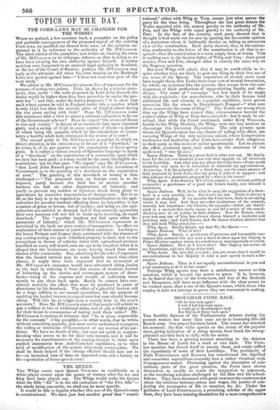TOPICS OF THE DAY.
THE CORN-LAWS MAY BE CHANGED FOR THE WORSE!
Winn( we noticed, a few numbers back, a pamphlet on the policy and probable consequences of the proposed repeal of the existing Corn-laws, we justified our dissent from sonic of the opinions ex- pressed in it by reference to the authority of Mr. M'Cur.r.ocn. The third edition of the pamphlet, now before us, bearing the name of Mr. M'CaLcocn on its titlepage, informs us that in doing so we have been arraying his own authority against himself. A similar accident once happened to an eminent legal authority in Scotland, at the bar of the Court of Session : perhaps Mr. M'CuLcocn may reply as the advocate did when his :own treatise on the Bankrupt Laws was quoted against him—" I have not read that part of the work lately." We advert to Mr. M'CvLLOCH's present line of argument for the purpose of noting two points. First, he shows by a tabular state- ment, that, under " the scale proposed by Lord John Russell, the duties would be higher then they have proved to be under the pre- sent law "; and that, under the duties proposed, " it is clear that such wheat cannot be sold in England under 56s. a quarter, which is only Ilid. less than the average price of English wheat during the ten years ending with 1840." Does Mr. M'CuLLoca make this statement with a view to create a national enthusiasm in favour of the Government scheme ? Does he expect "the stones of Rome to rise and mutiny" in favour of an increased duty upon imported grain, and a saving of in every quarter of wheat—a quarter of wheat being the quantity which by the Calculations of econo- mists a healthy adult male consumes in the course of a year ? The second point in Mr. M'Cur.cocu's pamphlet to which we direct attention, is his entoosimoosy in favour of a "drawback," as he terms it, of 5s. per quarter on the exportation of home-grown grain. It is rather a violent stretch of figurative language to speak of a "drawback" on the exportation of a commodity upon which no duty has been paid : a bounty would be the more intelligible de- nomination: but let that pass. "We regret," says Mr. M-Cut.Loce, "that Lord John Russell gave no intimation of the intentions of Government as to the granting of a drawback on the exportation of corn." The granting of this drawback or bounty is thus vindicated — " The proposed duty on foreign corn is to be imposed, partly because the land has to sustain peculiar burdens not laid on other departments of industry, and partly to prevent any sudden or injurious shock being given to agriculture by excessive importations of foreign corn. But in so far as the duty is to be regarded as an indemnification to the agri- culturists for peculiar burdens affecting them, its imposition is not a matter of grace or favour, but of justice ; and being so, the agri- culturists are entitled to demand, and if they correctly appreciate their own interests will not fail to insist upon receiving, an equal drawback." The " peculiar burdens not laid upon other de-. partments of industry," which Mr. M'Crccocn represents as sustained by the land, are pure matter of assumption : he offers no explanation of their nature or proof of their existence. Looking to the heavy Probate and Legacy duty, contrasted with the absence of any corresponding tax upon inherited property in land, and to the exemptions in favour of vehicles laden with agricultural produce inscribed on every toll-board, men are apt to be sceptical when it is alleged that the landowners are more heavily taxed than other classes of the community. But, admitting for the sake of argument that the landed interest may be more heavily taxed than other classes, it might have been expected that an economist of Mr. M'Cum.ocx's eminence would have advocated doing justice to the land by relieving it from this excess of taxation, instead of bolstering up the unwise and extravagant system of draw- backs—being at the expense and trouble of collecting taxes merely to pay them back again. Surely be cannot have con- sidered maturely the effect that must be produced in years of abundance by his drawback. The effect of a plentiful harvest will be a large addition to our annual expenditure, for the purpose of enabling the landed interest to export corn lest corn should become cheap. Will this be, to vulgar eyes, a seemly item in the year's accounts ? Does Mr. M'CULLOCH expect that people will submit to pay a million or two of additional taxes, and to pay a higher price for their bread in consequence of having paid these taxes ? Mr. M‘CtIct.ocn is anxious to intimate that " he is alone responsible for the contents" of his pamphlet,—in other words, that he writes without consulting anybody, and must not be understood to express the wishes or intentions of Government or any section of its par- tisans. We have no doubt of this; but men are quick in compre- hending what seems to be for their own interest, and it will be necessary for constituencies at the coming election to insist upon explicit statements from Anti-Corn-law candidates, as to what kind of modification of the system they really contemplate. We shall be finely helped if the change effected should turn out to be—an increased rate of duty on imported corn, and a bounty on the exportation of home-grown corn !


























 Previous page
Previous page